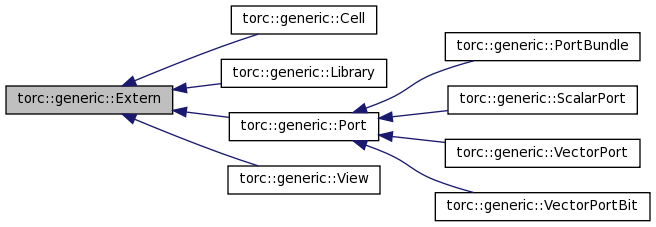torc::generic::Extern Class Reference
Used to imeplement extrenal object referencing. More...
#include <Extern.hpp>

Public Member Functions | |
| bool | getIsExtern () const throw () |
| bool | isExtern () const throw () |
| void | setIsExtern (bool inIsExtern) throw () |
Private Member Functions | |
| Extern (const Extern &source) throw () | |
| Extern & | operator= (const Extern &source) throw () |
Private Attributes | |
| bool | mIsExtern |
Detailed Description
Used to imeplement extrenal object referencing.The Extern interface is used by objects to create placeholders for objects that could not be found by the Linker. In itself, the class is pretty simple and uses a single boolean inSource to indicate whether an object is a real object or a place holder. Simplistically, extern objects are used to represent libraries, cells, views and ports declared using the EDIF (extern ... ) syntax. However, in case of multifile parsing, the Linker will try to remove externs from the design hierarchy with newly discovered items.
Definition at line 35 of file Extern.hpp.
Member Function Documentation
| bool torc::generic::Extern::getIsExtern | ( | ) | const throw () [inline] |
Get whether the item is an extern(placeholder) or an actual item.
- Returns:
- True if extern, false otherwise
Definition at line 96 of file Extern.hpp.
| bool torc::generic::Extern::isExtern | ( | ) | const throw () [inline] |
Get whether the item is an extern(placeholder) or an actual item.
- Returns:
- True if extern, false otherwise
Definition at line 106 of file Extern.hpp.
| void torc::generic::Extern::setIsExtern | ( | bool | inIsExtern | ) | throw () |
Set whether an item is extern or not.
- Parameters:
-
[in] isExtern True if extern, false otherwise
Definition at line 40 of file Extern.cpp.
The documentation for this class was generated from the following files:
- torc/generic/om/Extern.hpp
- torc/generic/om/Extern.cpp
 1.5.6
1.5.6